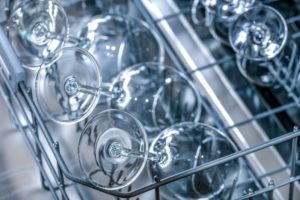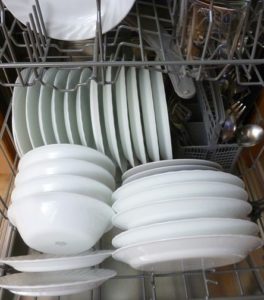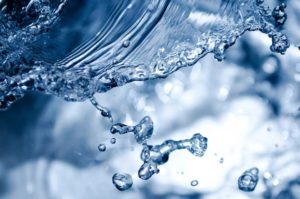
Cleaning is a key component of a typical commercial kitchen. Given the nature of your business, part of offering your customers great service involves maintaining excellent hygienic conditions. Not only do your food preparation areas need to be spotless but also the way you present and serve your dishes and beverages. No-one wants to eat from a dirty plate with below-par cutlery or drink from a glass smeared with lipstick.
Luckily, technology has made it is possible to efficiently maintain a clean and hygienic environment around your commercial establishment. Equipment such as commercial dishwashers, including undercounter dishwashers, pass through dishwashers and conveyor dishwashers, as well as undercounter glass washers easily, and thoroughly, clean your kitchen and bar wares.

There are a number of elements that contribute to a hygienic clean, including water temperature and using the correct detergents alongside the advancements in commercial dishwashers and glasswashers. Despite the ease of cleaning introduced by warewashing technology, one thing could still affect the level and quality of results you get from using your commercial ware washers. Hard water.
What Is Hard Water and How Can A Water Softener Help?
Hard water is any water that has high mineral content in it. These minerals can make it harder for the water to sufficiently clean your kitchen wares.
The hardness of the water in your area that is used for cleaning purposes can impact performance, wash results and the expected lifespan of the machine. This, in turn, affects efficiency in your commercial kitchen. There are ways, however, to reduce potential causes of breakdown.
While regular cleaning and maintenance of dishwashers can ensure expert cleaning results and a longer lifespan for equipment, there is an additional element that can help to combat potential operational hazards. It is possible to tackle the hard water problem using a water softener. A water softener is a unit that removes minerals such as magnesium and calcium present in water. Water softeners protect equipment and help reduce any deposits of calcium and limescale – things that not only harm the machine but also the pipes. Hard water is passed through the water softener which removes these minerals. You must consider using a water softener if you are facing a hard water problem.
Some of the equipment you will find in the market has built-in water softeners while others offer the option. There are also many external softeners available allowing you to tailor your equipment. Always check the water softener status before buying to make sure it can give you all the service you need. Read more about in-built and external water softeners and the potential costs involved in our ‘The Truth About Water Softeners in Warewashing’ guide.
You are likely to find two types of water softeners when purchasing a commercial dishwasher or undercounter glasswasher. A manual water softener and an automatic water softener. Both work to ensure that your water is in good condition to clean glasses, tableware, cookware and utensils without damaging your machines and pipes. However, each is different from the other.
It is important to understand these differences in order to make the right decision before any purchase.

Manual Water Softeners
A manual water softener requires manual input to ensure that the water you use remains free of magnesium and calcium. Water softeners will feature resin beads that attract the unwanted contents of the hard water, leaving suitably softened water free to pass through to the machine and into pipes. These beads can become saturated with minerals making them ineffective, thus regeneration is required. Introducing salt cleanses these resin beads, freeing them ready to continue efficiently softening the water. Failure to carry out regeneration will reduce the effectiveness of the water softener.
While manual water softeners typically have a cheaper purchase cost, you will often end up spending more money through the regeneration process as well as spending extra time repeatedly carrying out the hands-on process.
Failure to successfully regenerate the system when necessary will result in the build-up of deposits that will render your softener ineffective, leaving your ware washer at risk and your plates, cutlery, cooking utensils and glasses insufficiently cleaned.
Automatic Water Softeners
Automatic water softeners do not require manual regeneration and so are much more convenient. They come with software installed to refresh the resin at programmed intervals using the same process as the manual alternative: flooding the tank with brine which, in turn, removes the hardened minerals from the resin.
The automatic water softener’s regeneration can either be time initiated using a clock on the control valve or through a demand regeneration system which tracks your water usage. Demand regeneration is more efficient in terms of water and brine usage since regeneration only happens when needed.
While automatic water softeners are expensive to purchase, you will end up saving money the long run through energy conservation and time saved on manual intervention. Additionally, they cost less to maintain compared to their manual counterparts.
Determining the right size of your water softener
There are a number of factors that determine the size of a commercial water softener. These factors work together to calculate the size for efficiency purposes. They include water pressure, water temperature and flow rate. The aim of commercial sizing is to minimise salt use and maximise soft water capacity.
Commercial ware washing equipment uses high pressure, heated water with a dose of detergents to function. Due to the amount of work they tend to do, they are prone to troublesome build-ups of deposits, especially in hard water areas. Your water softener should comfortably accommodate these specifics in order to serve you well.

It is important for commercial kitchen owners around the country to have the right kind of water softener to operate with your commercial ware washer. Manufacturers generally recommend that all equipment should be used in conjunction with an appropriately sized water softener, whether that’s a manual, automatic, in-built or external model. Where warewasher breakdown occurs due to the effects of hard water and a water softener isn’t installed the warranty may be void.
Read more about other potential issues resulting from common mistakes made by staff using glasswashers that could impact performance and warranty.
Make the smart decision and invest in an appropriate warewashing water softener – the must have item for commercial dishwashers and undercounter glasswashers.
